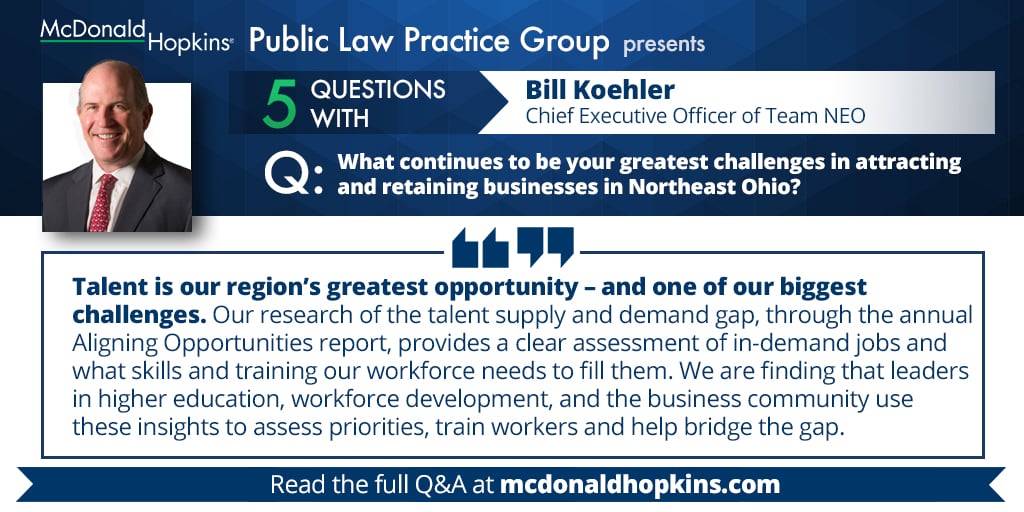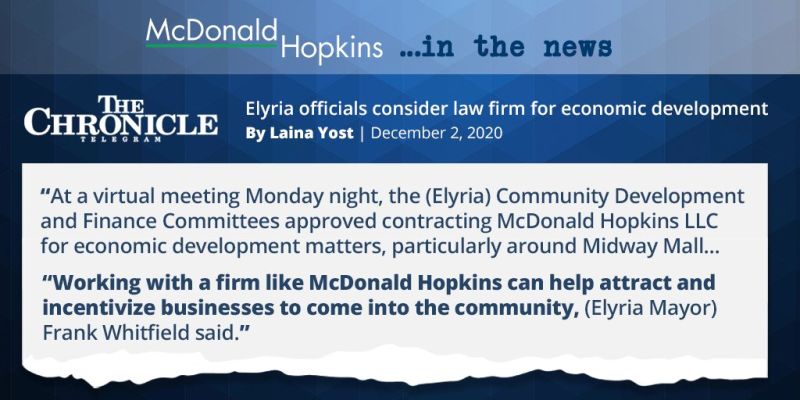To our friends, clients and colleagues in local and regional government, higher education and the nonprofit sector, welcome to our latest Monday Message from the Public Law Group at McDonald Hopkins. In today’s email, assembled by attorneys Dave Gunning, Teresa Metcalf Beasley, Kelsey Smith, and Kevin Butler, you’ll find insights into areas of law we’re watching on your behalf.
In today’s edition:
- Our monthly segment, ‘5 Questions With’ Team NEO chief executive officer, Bill Koehler
- Congress attempts to buy more time to reach COVID-19 stimulus package
- SEC expands definition of ‘accredited investors’
- Can states, public universities and other ‘sovereign’ entities be sued for IP violations?
- Campus free-speech bill heads to Governor DeWine for signature
- MH Public Law group tapped for economic development efforts in Elyria
In our monthly segment, ‘5 Questions With’ Team NEO chief executive officer, Bill Koehler

In today’s edition of the Monday Message, we’re excited to continue our series, “5 Questions With” – a monthly segment in which we ask local, regional and statewide leaders to pass along their wisdom on items of current and lasting interest, all in a brief, easy-to-read format.
For our latest installment we’ve asked Team NEO Chief Executive Officer Bill Koehler, to offer his views on the current state of economic development in the region and his organization’s contribution to Northeast Ohio’s success. Team NEO’s efforts to market the region, create and retain jobs, develop industry clusters, and serve as a strategic hub for current and prospective employers have been challenged amid the pandemic. Koehler’s response? “At Team NEO alone, we connected with nearly 300 Northeast Ohio companies during the earliest, most intense part of the pandemic to help determine supply chain, manufacturing and financial solutions needed to regain momentum and keep the economy moving.”
Read more from Koehler – including on Team NEO’s RightSites initiative to inventory available vacancies in order for Team NEO to respond rapidly to interest from companies rooting in Northeast Ohio – here or click the banner above.
Congress attempts to buy more time to reach COVID-19 stimulus package
Today Kelsey Smith offers an update on the latest COVID-19 stimulus talks in Washington:
Despite the widespread push to reach an agreement regarding COVID-19 economic relief, Congress has failed to reach a deal that would support Americans during the ongoing pandemic. In an attempt to buy more time, Congress passed a bill on Friday, December 11, that will fund the federal government for one more week. Members of both the House and Senate have expressed hope that the funding extension will give lawmakers the additional time needed to reach an agreement on new COVID-19 funding and assistance.
Striking a deal will be daunting. After months of failed negotiations, further talks stalled last week after Senate Majority Leader Mitch McConnell stated that Republican senators would not support the newly proposed COVID-19 stimulus bill, in part because of the proposed $160 million allocation to state and local governments. Democratic lawmakers introduced the $160 million allocation in exchange for a slimmed-down version of the Republicans' proposed liability shield. The scaled-down liability shield would provide six months to a year of liability protections from virus lawsuits for businesses and universities.
Although many Americans have been anxiously waiting for any update on COVID-19 assistance, Congress is now facing added pressure before approximately 12 million Americans lose their unemployment benefits on December 26, and the federal eviction moratorium expires at the end of the year. Both Senate and House leaders have stated that they will not adjourn, even through Christmas, until a new COVID-19 aid measure is passed. We’ll continue to provide updates here.
SEC expands definition of ‘accredited investors’
For those of you involved with the purchase and sale of private securities regulated under the Securities Act of 1933 and the Securities Exchange Act of 1934, a reminder that on Dec. 8, 2020, the definition of “accredited investors” was expanded whereby accredited investors are no longer limited to “professional” or “institutional” investors. “Accredited investors” now include limited liability companies with assets of more than $5 million that were not established for the specific purpose of acquiring securities, as well as certain “family offices,” “family clients” and other entities.
To learn more about how you might increase your investor pool for a securities offering, read MH’s blog post SEC modernizes the definition of accredited investor by our partners Ilir Pipa and Amy Wojnarwsky.
Can states, public universities and other ‘sovereign’ entities be sued for IP violations?
A question often nagging in-house counsel to governments, public colleges and universities and other public entities is the extent to which those entities may be sued for infringing third parties’ intellectual property rights. Our IP partner Erin Conway provides a helpful primer on how state sovereignty under the U.S. Constitution protects – and doesn’t protect – certain of those entities from IP lawsuits.
While local governments don’t enjoy sovereign immunity under the U.S. Constitution, states and certain state entities – public higher education among them – benefit from immunity when facing IP violations and infringement claims. “Sovereign state entities cannot be sued for federal intellectual property right infringement,” Erin writes, “but public universities are well known for going after infringers.” Read more in Erin’s post here.
Campus free-speech bill heads to Governor DeWine for signature
Today our Public Law partner Dave Gunning summarizes a law, S.B. 40, aimed at cementing Ohio college campuses as public free-speech forums and allowing contrarian viewpoints to be offered there. In his most recent blog post, Dave writes that the legislation emerged from a “battle in which universities (under pressure from faculty, students and the general public) across the country, and specifically here in Ohio, have tried to prevent certain types of speakers – mainly conservative speakers – from coming to their campuses to speak and for sponsored events.”
The bill is intended to broaden protections for free-speech activities on college campuses by eliminating many prohibited areas on campus where protected speech may occur and by allowing only specifically enumerated time, place and manner restrictions on protected speech. (Dave recently blogged on this subject, lamenting that “No longer can opposing or controversial speeches be allowed to be heard on universities across the county. … [I]f you are not perceived to be on the ‘correct’ side of the discussion, you are thwarted and even threatened at college campuses across the country.”) He draws a distinction between certain Ohio universities and Cleveland State University, which led the state in adopting a policy meant to restore confidence in the ability to engage in campus debate from all viewpoints.
S.B. 40 has just cleared both houses of the Ohio General Assembly and will be sent to Governor Mike DeWine for signature. Read more in Dave’s post here.
MH Public Law group tapped for economic development efforts in Elyria
We often mention sophisticated vehicles for economic development in our Monday Messages. Today we’re pleased to pass along the news that McDonald Hopkins, led by Todd Baumgartner, Kaitlin Corkran and Teresa Metcalf Beasley, has been engaged to assist the City of Elyria in significant efforts centered on the redevelopment of distressed commercial and industrial sites and the employment of special financing vehicles that will help the city prosper. More in the Elyria Chronicle-Telegram and below:

We’re back with our next edition of the Monday Message on December 28. Meanwhile, if you have questions or need assistance on any of the matters we’ve covered above or with your legal needs in general, please feel free to contact any member of the McDonald Hopkins Public Law team.
Have a great week!
Teresa Metcalf Beasley
Chair, Public Law